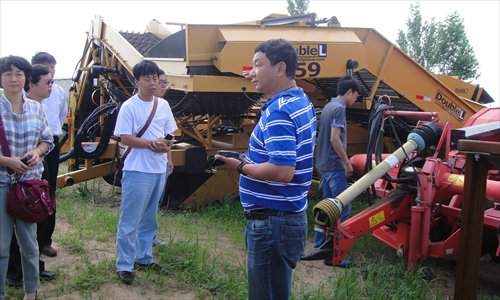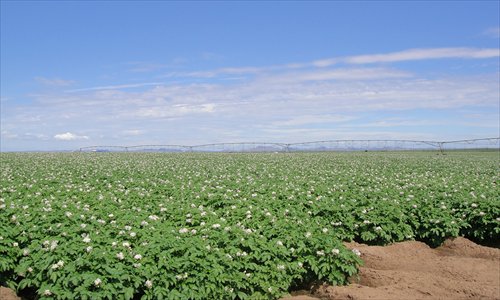PepsiCo and MOA host second potato farming training course

Zhou Xuhui shows off high-tech equipment at PepsiCo's potato farm in Chifeng, Inner Mongolia Autonomous Region. Courtesy: Liu Meng/GT

Spray irrigation has replaced traditional flood irrigation at PepsiCo's potato farm, helping to save water. Courtesy: Liu Meng/GT
Around 30 agro-technicians and management professionals from more than 10 provinces and autonomous regions, including Shandong, Anhui and Gansu, completed a three-day training course co-organized by PepsiCo and the Ministry of Agriculture (MOA) in Chifeng, Inner Mongolia Autonomous Region Thursday.
During the course, which focuses on sustainable potato farming and farm management, PepsiCo shared modern farm management practices and answered questions on the practical problems of potato farming. Participants were also invited to visit a local farm managed by PepsiCo to have a look at state-of-the-art machinery and learn advanced plantation methods.
In September 2011, PepsiCo and the MOA signed a memorandum of understanding under which both sides pledged to make joint efforts to promote advanced production and management techniques and implement modern farming developments in China. The first training course hosted by the two, held in Inner Mongolia in June 2013, was well-received. Building on that success, this year's training course focused more on building experience in the fields of scientific potato plantation and water and energy conservation.
As the world's largest producer of potato chips, PepsiCo has plentiful experience in potato farming all over the world. The use of scientific plantation methods not only increases yields, but does so in an environmentally sustainable way.
Zhou Xuhui, PepsiCo's Senior Manager of Chipstock Production, North Greater China Region, told Metropolitan that the company had planted 5,657 mu (377.1 hectare) of potatoes this year on the farm, which covers an area of about 8,400 mu. The remainder of the land is used to grow corn to fertilize the soil.
"Before we rented the farm in 2005, the land could hardly be used to grow potatoes. Now the yield per mu has reached about 3.3 tons, higher than the country's average yields," Zhou said.
Spray irrigation has been implemented to replace traditional flood irrigation methods, which Zhou said can save water consumption by 30 percent.
Ye Quanbao, director of the International Department of the MOA, said: "By leveraging our pragmatic cooperation with PepsiCo, we hope to introduce PepsiCo's advanced technologies, experiences and high-quality potato products to China to boost the rapid development of the domestic potato industry and help many farmers increase both production and income."
Yin Qigang, an agro-technician from the city of Jieshou, Anhui Province, said making the trip to Inner Mongolia to take part in the course had been worthwhile.
"Agriculture authorities in Jieshou have been engaged in promoting large-scale farming based on the platform of land circulation projects for more than two years, and large-scale farming demands the kind of scientific plantation methods and advanced farm management philosophies which we can learn from PepsiCo," Yin told Metropolitan.
PepsiCo Greater China Region (GCR) upholds a long-standing commitment to the "triple wins" of its sustainable agriculture, namely providing good income for local farmers and helping the environment, while doing good business, said Bob Shi, Operating VP of PepsiCo GCR.
"Over the past decade, more than 10,000 farmers have benefited from partnership with PepsiCo. We hope that by cooperating with the MOA, we can share our best practices and jointly contribute to the development of sustainable potato farming in China," said Shi.
Training course participants also visited the "PepsiCo Library," located in the Ar Horqin Banner of Inner Mongolia, and attended the "PepsiCo Scholarship" award ceremony. In 2007, PepsiCo GCR launched the "PepsiCo Library" project as an employee-driven initiative supporting the needs of rural village schools near its demonstration potato farms by providing books, desks, library equipment and funds. As of the end of 2013, PepsiCo GCR had donated more than 2.1 million yuan ($336,210) and set up 10 "PepsiCo Libraries" in seven provinces in China, benefiting more than 4,500 students.